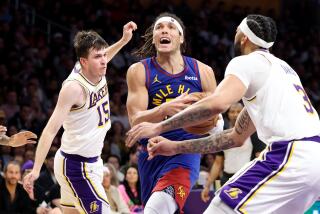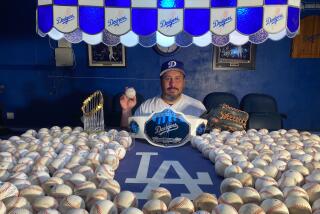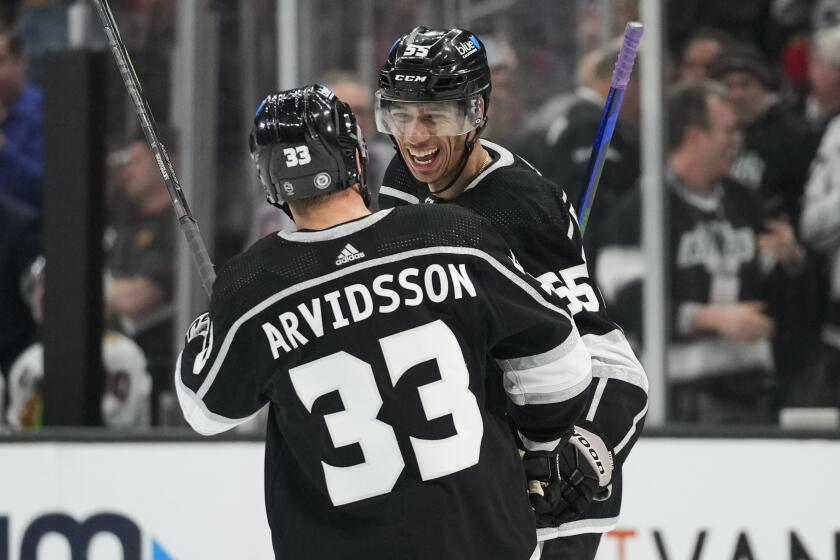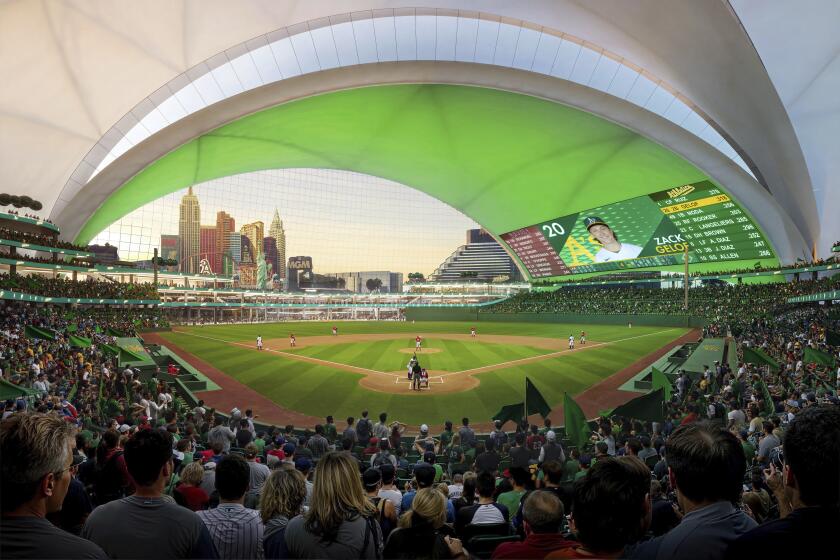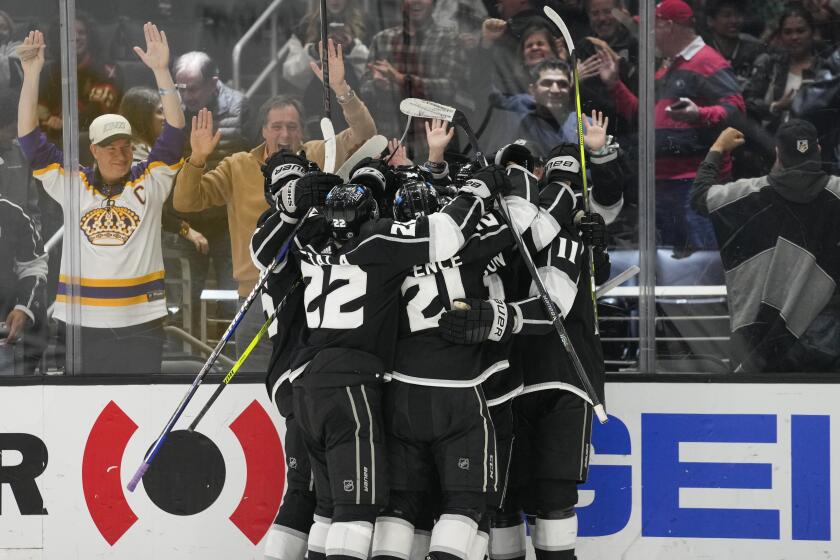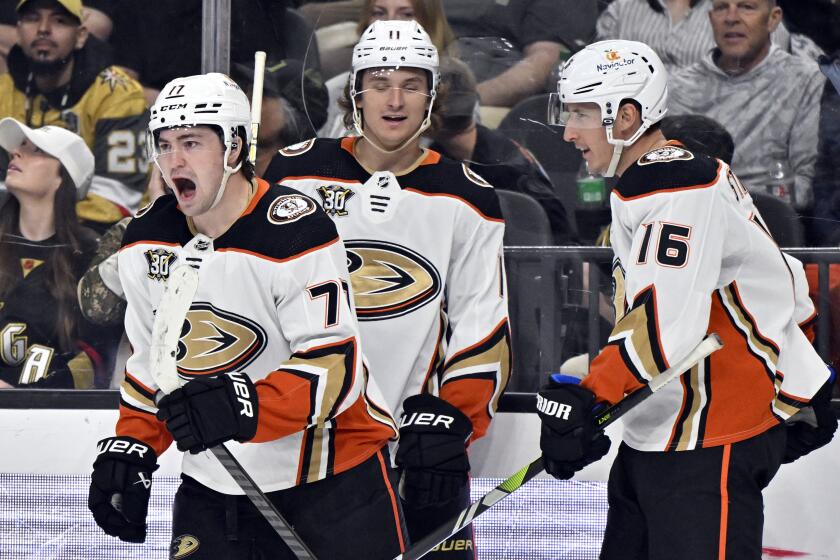Angels could quietly be building a playoff contender
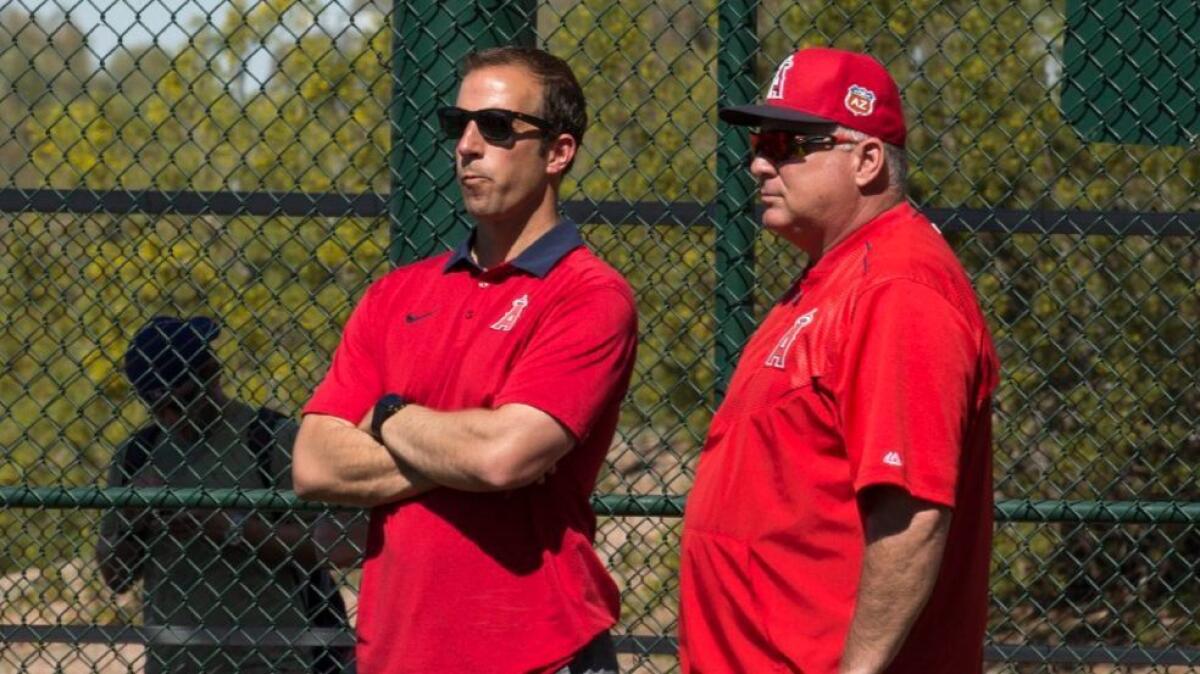
The anticipation is so great among Dodgers fans that nearly 30,000 fans showed up at Dodger Stadium on a Saturday in January. Not for a game. For a party — for balloons, music, autographs and interviews.
The Dodgers have won the National League West four years running. They still have Clayton Kershaw, and committed $192 million to retain Rich Hill, Kenley Jansen and Justin Turner.
The Dodgers just might have a playoff team this year.
The Angels had no fan festival, no splashy signings and no widespread anticipation for anything beyond Mike Trout. They spent $26 million this winter, most of it on a career .232 hitter. They lost 88 games last year, their worst season this century.
The Angels just might have a playoff team this year.
The man who patched enough holes to put them in that position is not offended that there is zero buzz about the Angels. He is a scout by training, a profession in which anonymity can be a competitive advantage.
“I like quiet,” General Manager Billy Eppler said.
That the Dodgers are primed for October is no surprise. They are projected as the best team in the major leagues by two leading analytical websites, Fangraphs and Baseball Prospectus.
That the Angels are primed for October is quite a surprise, given their bleak 2016 season, their weak minor league system and their meek budgetary allowance this winter.
Yet they are projected as the winner of a wild-card spot by Fangraphs. Could this really be a playoff team?
“Yes,” Eppler said. “We have the potential to be in the playoffs.”
You often hear general managers make bland and generic comments about how they remain open to whatever opportunities might present themselves to improve the club. Eppler breathed life into those words this winter, putting on a clinic in how to be opportunistic.
When the Detroit Tigers expressed a desire to cut payroll and faced a November deadline to exercise the $9-million option on Cameron Maybin, Eppler swooped in and grabbed Maybin to fill the Angels’ vacancy in left field, the first trade made by any team this off-season. Cost in top prospects? Zero.
When the Washington Nationals acquired outfielder Adam Eaton, thus moving Trea Turner back to shortstop and displacing Danny Espinosa, Eppler swooped in within three days and grabbed Espinosa to fill the Angels’ vacancy at second base. Cost in top prospects? Zero.
When supply and demand tilted the market for corner infielders toward the clubs, Eppler swooped in and got a desperately needed left-handed bat in Luis Valbuena, the aforementioned career .232 hitter, who had a higher on-base-plus-slugging-percentage last season than any Angel except Trout.
They have no great interest in catcher Matt Wieters, who is marooned in free agency. They could be opportunistic again, but the Angels do not consider Wieters so significant an upgrade that they would spend all the money on him now that they might need to upgrade elsewhere during the season.
Remember, though: The Angels scored just about as many runs as the Dodgers last season. Their issue is pitching, in quality and depth.
The Dodgers and Angels each used 15 starters last season, one shy of the major league high. The Dodgers prospered, even with Kershaw on the disabled list for two months. The Angels flopped.
It’s not all about the money. It helps that the Dodgers can afford a rotation in which two of three big-money arms — Scott Kazmir, Brandon McCarthy, Hyun-Jin Ryu — may not open this season in the rotation, but it also helps when the Dodgers can fill 19 starts last season with an unheralded fifth-round draft pick (Ross Stripling) and an unheralded sixth-round pick (Brock Stewart). The Angels, with no internal options when injuries hit, filled 26 starts by picking up Jhoulys Chacin and Tim Lincecum.
The Dodgers will pay Kershaw more this season than the Angels will pay their entire rotation. Yet it is the Angels’ rotation that is older, with three thirty-somethings — Jesse Chavez, Ricky Nolasco and Matt Shoemaker.
That is one of the negatives of a down farm system. Eppler could be opportunistic in signing another veteran starter or two for predictably mediocre work, but he has stocked up on former prospects that have failed to realize their potential elsewhere, including Manny Banuelos, Vicente Campos and Alex Meyer.
“We wanted to make sure that, if those players were dominating, they weren’t blocked,” Eppler said.
If the Angels can’t afford to buy quality arms, and if the minor league system can’t deliver them at the moment, Eppler is gambling that the team is better off rolling the dice on high-ceiling arms than on journeymen who might be gone in a year anyway.
He said he has had no conversations with longtime ace Jered Weaver about returning, no matter how opportunistic a deal the Angels might be able to strike.
“In our circumstances, we’re definitely trying to build that depth and build it through youth,” Eppler said. “That offers flexibility and youth you might not get in an older player. You might not get that chance to hit big.
“For us, we need to hit big on a couple things to really move our meter.”
That is true in the bullpen as well. Eppler has resisted the temptation to spend guaranteed money on the ample supply of free-agent relievers, a curious stance if this season really is about contending more than rebuilding.
Of all the projections out there, this might be the starkest: The Dodgers will have the best bullpen in the majors this year, and the Angels will have the worst.
Still, a leaky bullpen might be easier to fix during the season than a leaky rotation, and even a hideous bullpen did not keep the San Francisco Giants from earning a wild-card spot last season.
The Angels were 19 games out of first place by the end of June last season, their lack of depth painfully exposed, their rotation open to auditions. They dodged cries from far and near to trade Trout — to blow up the roster and get on with rebuilding.
Owner Arte Moreno had no interest in trading Trout. Eppler said he didn’t see why the Angels should.
“The injuries weren’t permanent,” Eppler said. “The contracts weren’t expiring. The players were coming back. That’s why I never had that despair.”
Even amid all the injuries the Angels improved their run differential from 2015 to 2016, from minus-14 to minus-10. The Texas Rangers won the American League West, at plus-8.
The Angels’ chances depend on their top three starters, and on comebacks from all three that Eppler cannot control: Tyler Skaggs from elbow ligament surgery, Garrett Richards from a stem-cell treatment alternative, and Matt Shoemaker from emergency brain surgery after he was hit in the head by a line drive last September.
Of their three contenders for closer, Huston Street is coming off knee surgery, Cam Bedrosian is coming off surgery to relieve a blood clot, and Andrew Bailey has posted an earned-run average below 5.00 once in his last four seasons, with shoulder surgery in between.
Every team has questions this time of year, even the Dodgers. February projections count for nothing in the standings.
There is no great mystery about the 2017 Angels. They can’t win if they can’t pitch. But, after a quietly effective winter, the hope that spring brings is not an illusion.
Follow Bill Shaikin on Twitter @BillShaikin
MORE SPORTS NEWS
Dodgers agree to terms with former Giants reliever Sergio Romo
Steve Sarkisian leaves Alabama to become offensive coordinator for Atlanta Falcons
Like the New England Patriots’ Bill Belichick, we’re already looking ahead to next season
More to Read
Get our high school sports newsletter
Prep Rally is devoted to the SoCal high school sports experience, bringing you scores, stories and a behind-the-scenes look at what makes prep sports so popular.
You may occasionally receive promotional content from the Los Angeles Times.

